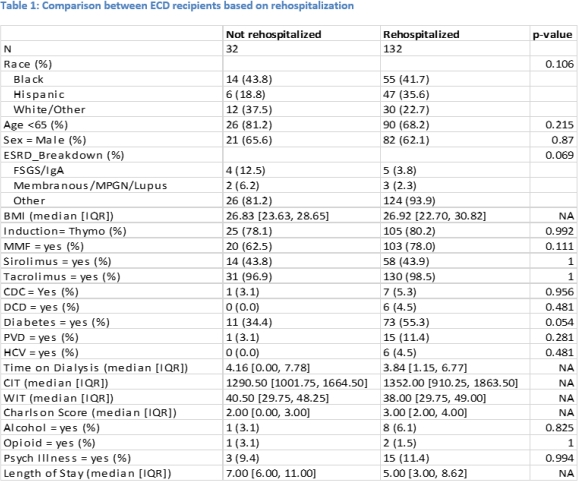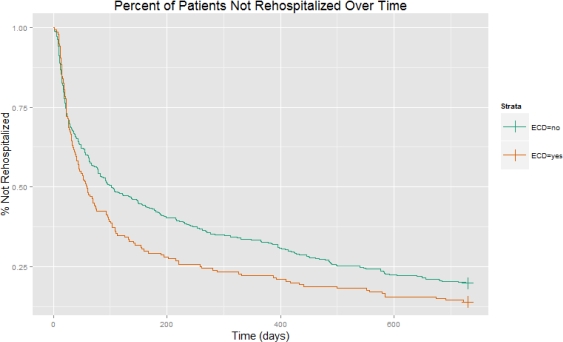Come Again? A Retrospective Cohort Study of Rehospitalization Following Expanded Criteria Donor Renal Transplantation
1Albert Einstein College of Medicine, Bronx, NY
2Montefiore Medical Center, Bronx, NY.
Meeting: 2015 American Transplant Congress
Abstract number: C62
Keywords: Length of stay
Session Information
Session Name: Poster Session C: Hospitalization/Readmission
Session Type: Poster Session
Date: Monday, May 4, 2015
Session Time: 5:30pm-6:30pm
 Presentation Time: 5:30pm-6:30pm
Presentation Time: 5:30pm-6:30pm
Location: Exhibit Hall E
Though ECD kidneys are commonly used, they have an increased risk of graft failure, which is associated with rehospitalizations within thirty days post-transplant. Our aim was to determine whether the association between ECD kidneys and rehospitalization continues throughout the first two years. We retrospectively reviewed all adult first-time transplants receiving deceased donor kidneys (381 SCD and 164 ECD) from 2003-2012 at our center. Covariates included: demographics, BMI, CDC kidney, Charlson score, ischemia times (cold/warm), ESRD etiology, hepatitis C, immunosuppressant regimen, psychiatric illnesses, alcoholism, hospitalizations before transplant, time on dialysis, and ECD.  Cox regression revealed a HR of 1.426 for rehospitalization within 1 year of transplant for ECD recipients (p=.002). There was no significance at 2 years (HR=1.22, p=0.0752).
Cox regression revealed a HR of 1.426 for rehospitalization within 1 year of transplant for ECD recipients (p=.002). There was no significance at 2 years (HR=1.22, p=0.0752).  Patients were propensity score matched for time on dialysis and prior admissions, and underwent relative risk regression analysis. The RR of rehospitalization within the first year was 1.338 for ECD recipients (p=0.00828). Significance was lost at 2 years (RR=1.088, P=0.238). A multivariate Andersen Gill model which considered the risk of multiple successive hospitalizations yielded HR of 1.503 (p=0.000382) and 1.359 (p=0.00461) for ECD recipients at 1 and 2 years post-transplantation, respectively. Finally, multivariate linear regression failed to find any association between ECD and length of hospital stay. We conclude receiving an ECD kidney is independently associated with increased risk of rehospitalization within 1 year but not 2 years post-transplant, and without an association with length of stay.
Patients were propensity score matched for time on dialysis and prior admissions, and underwent relative risk regression analysis. The RR of rehospitalization within the first year was 1.338 for ECD recipients (p=0.00828). Significance was lost at 2 years (RR=1.088, P=0.238). A multivariate Andersen Gill model which considered the risk of multiple successive hospitalizations yielded HR of 1.503 (p=0.000382) and 1.359 (p=0.00461) for ECD recipients at 1 and 2 years post-transplantation, respectively. Finally, multivariate linear regression failed to find any association between ECD and length of hospital stay. We conclude receiving an ECD kidney is independently associated with increased risk of rehospitalization within 1 year but not 2 years post-transplant, and without an association with length of stay.
To cite this abstract in AMA style:
Hung M, Dunn C, Holtzman A, Bellin E, Greenstein S. Come Again? A Retrospective Cohort Study of Rehospitalization Following Expanded Criteria Donor Renal Transplantation [abstract]. Am J Transplant. 2015; 15 (suppl 3). https://atcmeetingabstracts.com/abstract/come-again-a-retrospective-cohort-study-of-rehospitalization-following-expanded-criteria-donor-renal-transplantation/. Accessed February 17, 2026.« Back to 2015 American Transplant Congress
